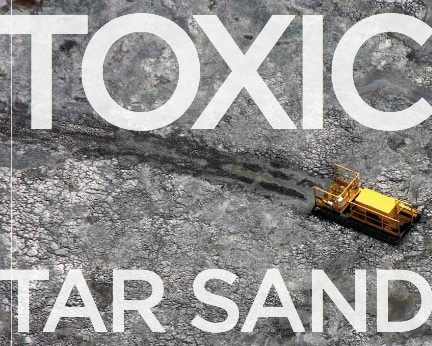Many Americans who have never heard of the Alberta tar sands soon will. The tar sands is one of the largest, dirtiest, and most destructive projects on Earth, and is likely coming to a community near you. The oil industry is expanding facilities to process toxic tar sands oil in the U.S. through a network of refineries and pipelines. With plans to triple refining and transportation of tar sands by 2015, there is no question that air pollution and health problems in communities from the Great Lakes to the Gulf Coast will increase.
Public health in several U.S. states is already under threat from dramatic increases in refining pollution, and massive pipelines are planned to cross the United States’ largest freshwater aquifer, which supplies one-third of U.S. agriculture.
Tar sands crude contains heavy metals, and refining tar sands releases polycyclic aromatic hydrocarbons linked to pre-natal brain damage, and smog and ozone-depleting chemicals and compounds. Exposure to these toxics is linked to asthma, emphysema and other lung diseases. That says nothing of the devastating impacts on air, water, and soil.
With the environmental and health impacts of the tar sands well known, but no sign of an end to the environmental trauma, the Sierra Club’s latest report shows the personal side of the impacts of dirty oil in North American communities. Americans and Canadians are worried about Alberta’s tar sands expansion poisoning their water, destroying their farmland, and contaminating their air.
The report profiles thirteen people from across North America whose health and livelihoods are at risk as a result of toxic tar sands expansion. For First Nations communities, farmers, homeowners, families, environmentalists, and concerned citizens, this isn’t a question of corporate profits, but a question of life and death, health, family, and future generations.
By bringing a personalized story to the implications of tar sands expansion, the report demonstrates that the impacts of Alberta’s tar sands are far more broad than the tailings ponds of northern Alberta, and that there are unheard voices decrying efforts to expand tar sands production and extend the world’s addiction to dirty oil. The report profiles individuals in Alberta, Michigan, Minnesota, Texas, Indiana, South Dakota, Nebraska and Kansas who will be directly impacted by the Keystone XL pipeline, which would transport 900,000 barrels of oil a day nearly 2,000 miles from Alberta, Canada to U.S. Gulf Coast refineries.
Sierra Club’s Director of National Dirty Fuels Campaign Kate Colarulli wants politicians to see that the pipeline is not in our national interest. She also wants them to engage their political representatives and tell them to stop this dangerous project from moving forward.
Rather than investing in a toxic future where the question of oil spills isn’t “if” but “when”, public health and the environment need not be put at risk to enrich foreign oil companies. Rather than investing in a future where drinking water, air, and farmland are destroyed to import the world’s dirtiest oil, we should be investing in clean energy.
“As our nation’s worst-ever economic recession drags on, creating jobs in the clean energy sector should be priority number one,” said Collarulli. “Building the poisonous Keystone XL pipeline would put the brakes on clean energy, and exacerbate the pollution and public health problems that come with America’s dependence on dirty, dangerous oil.”
Download the full text of the Sierra Club tar sands report [PDF] to learn more about this ill-conceived pipeline plan.
Subscribe to our newsletter
Stay up to date with DeSmog news and alerts






